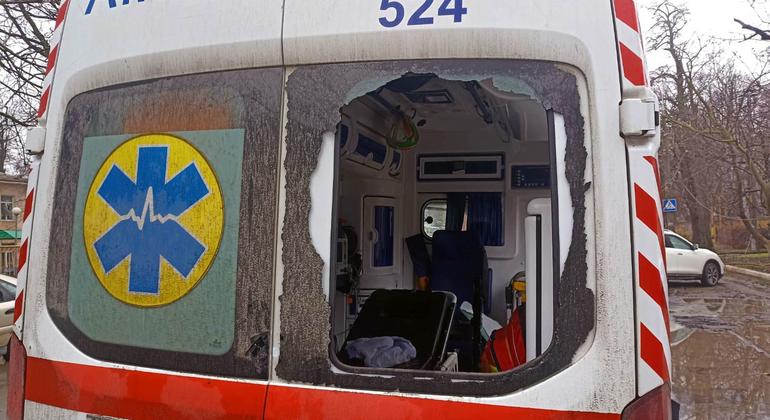World news in brief: Ukraine warns of new attacks, many Nicaraguan NGOs close, disinformation in DRC

UN Resident Coordinator Matthias Schmale said the attack damaged a transit centre in the town of Pokrovsk “where people had fled to find safety”.
In a statement, he stressed that civilians and civilian infrastructure – including humanitarian facilities – are protected under international humanitarian law, “which must be respected”.
Deadly airstrikes over the past week in Pokrovsk and the towns of Myrnohrad and Toretsk have caused damage to homes and schools, UN spokesman Stéphane Dujarric told reporters in New York.
“Aid workers in Myrnohrad have responded by providing emergency supplies and psychosocial support to those affected,” he said at his daily press briefing. “Our humanitarian colleagues note that civilians – including humanitarian workers – face daily threats to their safety and hostility in Ukraine.”
Support for retirees
In a related development, the United Nations World Food Programme (World Food Programme) announced that nearly half a million pensioners living near Ukraine’s front lines have received vital cash assistance.
The WFP programme works in partnership with the Ukrainian authorities, with funding from several European Union countries and private donors. Nearly $50 million has been distributed over the past 12 months to pensioners who receive less than $81 a month from the government.
The UN agency also distributes food boxes to areas closest to the frontlines, “where food is hard to find or very expensive”, and provides daily hot meals to 90,000 school children across the country, among other support.
News of WFP support comes as the UN migration agency IOM warned that ongoing hostilities in Ukraine continue to “harm civilians, destroy homes and disrupt vital services”, some two and a half years since Russia’s full-scale invasion.
Nicaragua’s ban on 1,500 NGOs ’causes deep alarm’
UN human rights office spokeswoman Liz Throssell said the Nicaraguan government’s decision to ban a further 1,500 civil society organisations – half of them religious associations – was “deeply alarming”. said on tuesday.
This is especially true considering that public space in the Central American country has “fundamentally eroded in recent years” amid unwarranted restrictions on religious freedom.
The latest closure orders announced on Monday mean that more than 5,000 organisations, including NGOs, media outlets and private universities, have now had their legal status revoked by the Government of Daniel Ortega – most of them effective from the end of June 2022.
Government takeover
“All of their assets are under the control of the Government,” Ms. Throssell continued, noting that “the serious impact of these measures…makes it increasingly difficult to protect human rights in Nicaragua.”
It has also forced some civil society groups that remain active to censor their own activities for fear of being shut down.
“We once again call on the Nicaraguan authorities to stop imposing severe restrictions on civil and democratic spaces in the country and to ensure respect for human rights, in accordance with Nicaragua’s international human rights obligations,” she concluded.
Misinformation still rampant in DR Congo’s North Kivu, fueling violence
United Nations Peacekeeping Mission in the Democratic Republic of Congo (DRC) MONUSCO said on Tuesday that misinformation, disinformation and hate speech continue to fuel violence and social breakdown in the restive North Kivu region.

The United Nations Mission in the Democratic Republic of Congo, MONUSCO, hosted a discussion forum with one hundred media actors, including 23 women. They were radio journalists, print journalists, WhatsApp group administrators and social media influencers active in the region as part of a campaign to curb misinformation and disinformation in the region.
The peacekeeping force is tasked with protecting civilians across eastern DRC, where numerous armed groups continue to clash with government forces and carry out attacks on civilians.
UN spokesman Dujarric told reporters on Tuesday that peacekeepers had been deployed to Gina in North Kivu in response to a warning that Zaire armed groups had surrounded a Congolese National Police station in the area.
Peacekeeping forces provide deterrence
“The UN peacekeeping force has stopped the Zairean armed group fighters in close coordination with the Congolese Armed Forces, forcing the Zairean fighters to retreat,” he added.
MONUSCO also deployed a patrol to the Kwe mining area, near Bunia in Ituri province, after members of the CODECO armed group attempted an attack.
“Meanwhile, the Mission notes the continued use of disinformation, disinformation and hate speech, particularly in the context of the M23 rebellion in North Kivu, which threatens social cohesion and security in the region,” Mr. Dujarric continued.
In response, MONUSCO organized a discussion forum for about 100 local journalists and influencers in the regional capital Goma “to promote responsible reporting in support of peace and stability in the region.”




